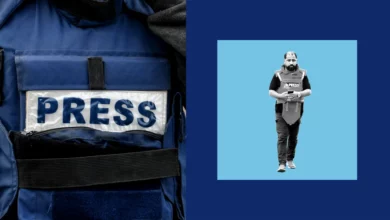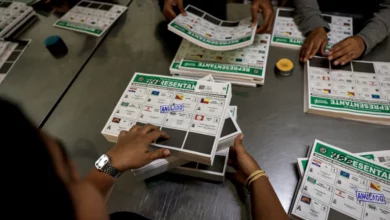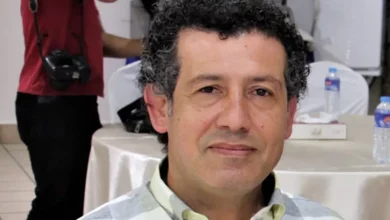Major incidents seen in the recent weeks compel us to ask Egypt’s regime about its relationship with Israel, a relationship that seems to go beyond the stipulations laid down in the peace treaty between the two countries. The current relationship between the Egypt and Israel appears to threaten Egypt’s national security, which the regime’s proponents talk about so passionately.
I therefore put forward the following 20 questions for the regime.
1. What does it mean when someone like Mostafa el-Fiqqi, a leading member of the ruling National Democratic Party (NDP) and head of an important committee in the People’s Assembly, says in a recent interview with Al-Masry Al-Youm that "the coming president of Egypt must be approved by the US and not be rejected by Israel"? Or that Gamal Mubarak is "the expected NDP candidate if the presidency becomes vacant"? Is there some link between the two statements? Can it be inferred that Gamal has received the approval of Israel and the US? Is Egypt becoming another Iraq? What sovereignty are we talking about when one must garner the consent of foreign countries to become president? How does that serve Egypt’s national security?
2. Why hasn’t the regime produced anyone like Turkish Prime Minister Recip Tayep Erdogan–the only leader in the region to stand up to Israeli arrogance, even though his country has diplomatic relations with Israel? What exactly does Israel hold against Egypt that makes Israel’s policy towards Egypt involve such humiliation–while Erdogan frequently chastises Israel, as he did last week?
3. Why does the regime remain silent, even though it’s aware of Israeli preparations to attack Gaza? Details of the looming operation have been announced on Israeli television and been mentioned in the newspapers. The operation will last for one week and feature all sorts of weapons–only the launch date remains to be set by the end of January. Why doesn’t Egypt warn Israel against carrying out such an offensive, and do so publicly in order to protect itself from accusations of collusion with Israel?
4. Why does the regime seem to be at a loss for words in the face of recent attacks on Gaza, which have left many Palestinians killed or injured? What’s more, these attacks have targeted the border between Egypt and Gaza, and some of them–according to the press–have forced dozens of residents of Egyptian Rafah to flee their homes after being rocked by bomb blasts.
5. Now let us pose a retrospective question: Why did the regime remain silent when Operation Cast Lead 1 was carried out, even though it knew of the 23-day operation in advance? How true is the statement by Amos Galbou, former head of research at the Israeli Institute for Intelligence and Special Operations–which I quote from an article by Fahmi Howeidi in Al-Shorouq–that the Egyptian regime "created the circumstances for us to carry on with the campaign despite the deaths of hundreds of Palestinians and prevented action in favor of the Palestinians while the war was being waged"?
6. Why does the regime remain silent about Israel’s announcement of the construction of 692 housing units in three districts in East Jerusalem, which the international community doesn’t recognize as belonging to Israel? This settlement-building scheme was launched immediately following Netanyahu’s visit to Egypt in the last week of December.
7. What is the rationale behind the timing of Netanyahu’s visits to Egypt, which can most politely be described as "mistimed." His last visit was on 29 December, at a time when there was considerable wrath over Egypt’s construction of the steel border wall in Rafah and the delay of the Lifeline 3 Convoy to Gaza, and when hundreds of international activists were protesting the blockade on Gaza here in Cairo. Why did Netanyahu and Mubarak share a table, leaving Egyptians mortified, during the Israeli prime minister’s Ramadan visit? Is Netanyahu that beloved by the regime, while George Galloway–the head of the UK’s Respect Party and member of the British House of Commons for 30 years–is viewed as an unwelcome intruder?
8. Why doesn’t the regime respect the widespread sense of indignation that has prompted some Egyptians to file a report with the attorney general demanding the arrest of the Israeli PM for war crimes–a claim that is supported by evidence in the UN’s Goldstone Report? Why doesn’t Egypt–let alone the Arab League–work towards the prosecution of Israeli military leaders while other countries do?
9. If it’s true that "Mubarak demands that Netanyahu adopt procedures to lift the blockade on Gaza and alleviate the suffering of Palestinians," as official daily Al-Ahram reported on 30 December, then how did Netanyahu respond? What did Abul Gheit’s statement mean when he said after a meeting with Netanyahu that he had "talked about positions that Egypt believes surpass anything we’ve heard in a long time"? Why did he describe the talks as "positive" and in what way were they so?
10. How come the regime is so lacking in wisdom as to announce that the president demanded the lifting of the blockade on Gaza–when the papers are rife with news that Egypt is building a steel wall to cordon off the strip, is stopping relief convoys from entering Gaza, and being unreasonably stubborn with more than 1400 foreign activists who sought to expose Israeli crimes?
11. Why did the regime allow the Abu Hasira moulid–a Jewish festival–to take place in Beheira in early January, despite a court verdict abolishing the event altogether? Why wasn’t the regime bold enough to publicly announce the festival, details of which we only read about in Israeli daily Haaretz? If the moulid was called off last year owing to the offensive against Gaza, does that mean it’s back on again now that the assault is over?
12. Why did the regime allow 17 Israeli families to visit the Gulf of Suez to commemorate their war dead when our prisoners of war–killed at the hands of Israeli soldiers–can’t be traced or visited at the places of their martyrdom?
13. Why does the Egyptian regime so determinedly insist on keeping the Rafah border crossing closed under the pretext of respecting the international agreement on passage through the crossing, when, in fact, Egypt was never a party to that one-year agreement, which expired back in November 2005? To what extent is "official Egypt" serving the interests of Israel and the Palestinian Authority? Why is Egypt so disgracefully weak in the face of Israel–and so aggressive when it comes to the Palestinians?
14. Why is Egypt always absolving itself of blame by stating that the Rafah crossing, according to the crossing agreement, should be used for the passage of individuals and medical relief aid, but not goods–even though the agreement stipulates that it can, in fact, be used for the passage of goods? If the restriction in the agreement concerns the flow of goods "into" Egypt, then why doesn’Egypt export goods to Gaza through the Rafah crossing–especially when Israel is tightening the blockade on Gaza by closing the other six crossings under its authority? How can the policies of both Egypt and Israel–which make the closing of the border crossings the rule and their opening the exception–coincide so shamefully? How can Egypt allow it to appear as if it were working with Israel to tighten the blockade? How can Gaza become the enemy and Israel the ally?
15. The regime declared about one year ago that Egypt wasn’t a party to a security agreement between Israel and the US, signed towards the end of George W. Bush’s term, which sought to stem the smuggling of goods into Gaza. Did Egypt sign on to the agreement later? Is Egypt coordinating its procedures? Or being informed of the steps to implement it?
16. Why isn’t the regime using the pressure exerted on it by Israel and the US to stop the smuggling of goods via underground tunnels, the international campaign against the erection of the shameful wall in Rafah, and the public wrath over the Gaza blockade to demand an amendment to Egypt’s peace agreement with Israel? Amending the agreement to allow a larger presence of Egyptian soldiers and more advanced arms in Sinai would bolster Egypt’s national security, allow it to exercise greater sovereignty over its land, and combat the smuggling of goods without resorting to the building of a "wall of shame."
17. Following the killing of Egyptian soldier Ahmed Shaaban at the Rafah crossing, why hasn’t the regime requested that Hamas form a committee, which could include members of the Arab League, to investigate the incident? Such an investigation is much needed–especially since reports have been contradictory, with some saying it was friendly fire, others attributing it to Hamas, and yet others to the Israelis.
18. Why haven’t our martyrs on the borders with Israel been honored as was our martyr on the border with Gaza? Why wasn’t an official funeral service held for them and special bonuses and pensions given their families? Why have those incidents passed seemingly unnoticed? Why weren’t we angry? Why haven’t we asked Israel to investigate the injury of one of our soldiers on the borders with Israel on 9 May 2001; the killing of another on 30 June 2001; the injury of an Egyptian major on patrol on 5 November 2001; the killing of three soldiers by an Israeli missile on 18 September 2004; the killing of an Egyptian officer that Israel claimed had entered its territory on 9 July 2008; the killing of an Egyptian soldier on 1 May 2009; the injury of an Egyptian soldier near Eilat on 17 August 2009; and the killing of an Egyptian soldier on 2 September 2009?
Why haven’t we asked Israel to launch investigations into the injury of an Egyptian farmer and his aunt near the Salah el-Din Gate on 12 November 2000; the injury of an Egyptian woman in her home near the border on 15 April 2001; the killing of an Egyptian man near the Salah el-Din Gate on 30 April 2001; the injury of an Egyptian citizen while in his home in Rafah on 30 May 2001; the killing of an Egyptian man by a bullet on 23 December 2001; the killing of several Egyptians during a clash with an Israeli patrol on 2 June 2006, which was followed by a Mubarak-Olmert meeting in Sharm el-Sheikh; and the killing of an Egyptian near the Karm Abu Salem crossing on 21 May 2008?
19. We would also like to ask about the peace plan currently being cooked up with the US and Israel, with the help of "moderate" Arab countries. What role is Egypt playing in this? And what benefits are we reaping from this role?
20. Finally, we want to ask the regime what benefit it gleans from adopting policies–some of which are declared, others covert, and all invariably disgusting–that dovetail so nicely with Israeli and US interests?
Translated from the Arabic Edition.




